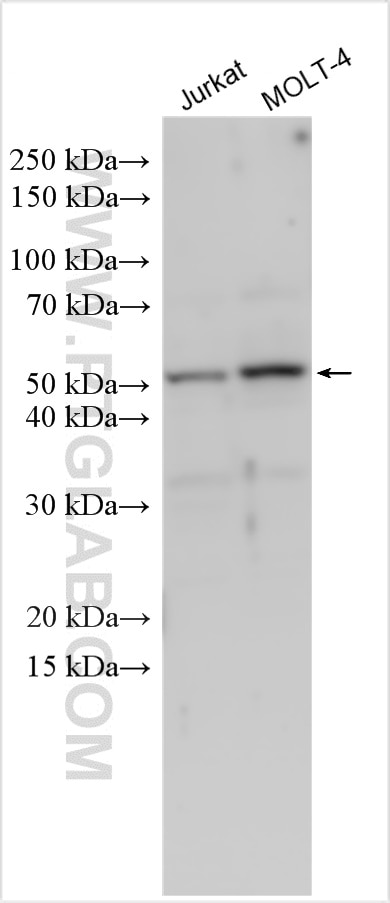CD1e Polyclonal antibody
CD1e Polyclonal Antibody for WB, ELISA
Host / Isotype
Rabbit / IgG
Reactivity
human
Applications
WB, ELISA
Conjugate
Unconjugated
Cat no : 22463-1-AP
Synonyms
Validation Data Gallery
Tested Applications
| Positive WB detected in | Jurkat cells, MOLT-4 cells |
Recommended dilution
| Application | Dilution |
|---|---|
| Western Blot (WB) | WB : 1:500-1:1000 |
| It is recommended that this reagent should be titrated in each testing system to obtain optimal results. | |
| Sample-dependent, Check data in validation data gallery. | |
Product Information
22463-1-AP targets CD1e in WB, ELISA applications and shows reactivity with human samples.
| Tested Reactivity | human |
| Host / Isotype | Rabbit / IgG |
| Class | Polyclonal |
| Type | Antibody |
| Immunogen | CD1e fusion protein Ag18008 相同性解析による交差性が予測される生物種 |
| Full Name | CD1e molecule |
| Calculated molecular weight | 388 aa, 44 kDa |
| Observed molecular weight | 51 kDa |
| GenBank accession number | BC131693 |
| Gene symbol | CD1E |
| Gene ID (NCBI) | 913 |
| Conjugate | Unconjugated |
| Form | Liquid |
| Purification Method | Antigen Affinity purified |
| Storage Buffer | PBS with 0.02% sodium azide and 50% glycerol pH 7.3. |
| Storage Conditions | Store at -20°C. Stable for one year after shipment. Aliquoting is unnecessary for -20oC storage. |
Background Information
CD1e molecule (CD1e, also known as R2 and CD1A) is a member of the CD1 family of transmembrane glycoproteins, which are structurally related to the major histocompatibility complex (MHC) proteins and form heterodimers with beta-2-microglobulin (PMID: 10948205). The discoverers of the CD1 locus originally separated CD1 proteins into group 1 (CD1a, CD1b, and CD1c) and group 2 (CD1d), based on amino acid sequence homology (PMID: 2467814). CD1e is an important modulator of group 1 and group 2 CD1-restricted responses influencing the lipid antigen availability and the generation and persistence of CD1-lipid complexes (PMID: 21844346).
Protocols
| Product Specific Protocols | |
|---|---|
| WB protocol for CD1e antibody 22463-1-AP | Download protocol |
| Standard Protocols | |
|---|---|
| Click here to view our Standard Protocols |








